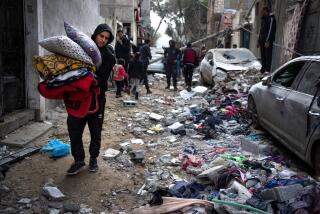Perspective on the Gulf Crisis : . . . and Keep the Political Ends in Mind : To destroy Kuwait in order to save it is the worst thing we could do. Instead, go after Iraq’s army in the desert.
- Share via
If it does become necessary for the United States and allied forces to launch a military offensive against Iraq, we must hope that the plans being laid by military commanders are more sensible than some of the dubious schemes being bandied about in the press. War and politics are inseparable, and it would be pointless to win this war in a manner that would doom the following peace.
The first faulty notion is the idea of a “strategic air offensive” against Iraq--wide-ranging bombing that broadly targets Iraqi industry, destroys chemical weapons facilities and violently upsets the lives of Baghdad’s civilians. Some commentators advocate achieving the same ends with more precisely targeted commando raids or “surgical air strikes,” although such strikes are much more often imagined than achieved.
The fact is, Iraq has only one industry worth mentioning, and that is oil. Should we find ourselves in a shooting war, one key purpose of which is to ensure the flow of petroleum to the world’s economy, it is senseless to destroy that industry. As an economic factor in Iraq’s defense, it has already been shut down by the embargo. As a military factor, the oil fields are irrelevant. Their destruction would have no impact on Iraqi military fuel supplies during the short--though undoubtedly bloody--conflict.
Bombing chemical plants is even less sensible. There would be no effect on Iraq’s immediately available stocks of chemical munitions, but it would poison large areas of land (which we would later have to clean up) and horribly kill hundreds or thousands of Iraqi civilians. (That it might kill Western hostages as well must not be a factor in our thinking; the responsibility for their deaths would be Hussein’s.)
Bombing Baghdad is a similarly bad idea. We know from long experience that bombing populations merely makes them identify their own fortunes with those of the regime under attack. Far more demoralizing would be empty store shelves and a steady flow of telegrams announcing the deaths of soldier sons and husbands in nameless losing battles in the desert.
Perhaps the most absurd idea is that of invading Kuwait and “liberating” it without a “provocative” invasion of Iraq itself. It seems that the old concept of burning the village in order to save it is still with us. Any pitched battle in Kuwait City will leave it a pile of corpse-strewn rubble. This will win us few friends among the survivors.
The most disturbing thing about this speculation on our military plans is that it may not be wrong. In Vietnam, we tried to bomb a country that was hardly out of the Bronze Age back to the Stone Age. That policy bore no positive fruit because, as with Iraq today, the Vietnamese economy was not the source of the enemy’s weaponry.
Nevertheless, the military might that we are pouring into the Persian Gulf with such truly impressive speed can still be put to practical offensive use. Saddam Hussein’s regime does have one vital organ that provides a politically and militarily ideal target: the million-strong Iraqi army.
With one 1 of 17 Iraqis now in uniform, merely supplying the military is a crushing burden. It is a conventional, armor-heavy force that must concentrate to be effective, thus offering an ideal target for Western air- and ground-based firepower. It will be deprived of air support within a few days of the outbreak of war. The Iraqi army is, in fact, exactly the kind of target American military planners must have dreamed about for years: the Soviet army without the Bomb (yet), without air cover, without a massive population and industrial base to back it up.
If we are going to wage war, we need to keep our political and economic ends in view. We must not destroy the oil industry that is our object to preserve, nor alienate the moderate Arab states while destroying a radical one. We cannot afford to provide Saddam Hussein with nightly news footage of little Arab girls running down the road with their backs on fire--especially not little Kuwaiti girls.
On the other hand, the deaths of thousands of Iraqi men in uniform will prove entirely acceptable to world opinion. If we beat Hussein’s field army in the desert, his garrison in Kuwait will wither on the vine.
Our greatest strategic advantage in this struggle is the moral high ground. Let’s keep it.
More to Read
Sign up for Essential California
The most important California stories and recommendations in your inbox every morning.
You may occasionally receive promotional content from the Los Angeles Times.













